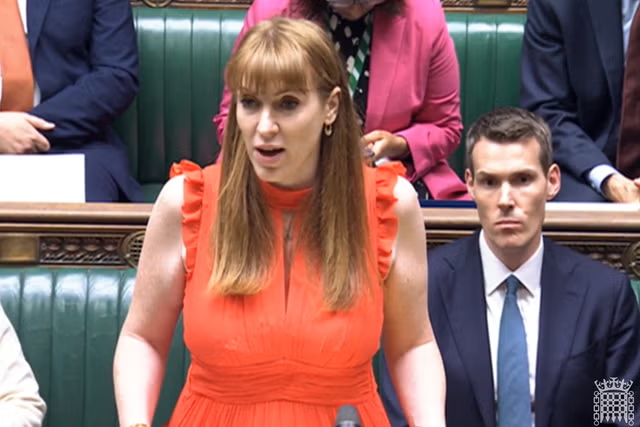A shake-up of the planning system to pave the way for 1.5 million new homes to be built over the next five years has been set out by the government.
Housing Secretary Angela Rayner said mandatory housing targets for England, which were scrapped by the previous Conservative government in December, would be restored.
And she said the annual target would be increased from 300,000 homes to just over 370,000.
However, the target for London would be lowered from the previous 100,000 to about 80,000 - which she said the mayor of London, Sadiq Khan, is "determined to rise to".
Follow live politics updates
Ms Rayner announced the government is changing the method used to calculate how many houses are needed in an area "so we better reflect the urgency of supply for local areas".
And the rules will require 50% of new housing to be affordable "with a focus on social rent".
Some £450m of the local authority housing fund will go to councils to provide 2,000 new homes, Ms Rayner said.
She said the plan was "radical" and would be controversial but the housing crisis is "urgent".

Housing minister Matthew Pennycook will meet major developers on Tuesday "to ensure that they commit to matching our pace of reform", she said.
More than 30 home builders signed a statement supporting the reintroduction of mandatory housing targets and releasing of "grey belt" land.
Shadow housing secretary Kemi Badenoch accused Ms Rayner of giving the go-ahead to build "1.5 million ugly homes" in England as part of the new planning reforms.
She said the new government wants to drop the requirement for new homes to be "beautiful", but Ms Rayner said that is subjective, difficult to define and leads to inconsistent decision-making on applications.
Keep up with all the latest news from the UK and around the world by following Sky News
Tap hereBrownfield sites 'first port of call'
The reforms, Ms Rayner said, make explicit that brownfield development should be "the first port of call" and said they will promote higher density homebuilding in urban centres.
She said some low-quality green belt land would be freed up for construction under the plans - and a new definition of what constitutes low-quality green belt land would be provided.
There will be a requirement for developers to provide money for supportive infrastructure such as schools, GP surgeries and transport links as well as improvements to accessible green space.
Developers already have to do this but Ms Rayner said her government would change "the previous government's haphazard approach to building on the green belt that has seen so many of the wrong homes built in the wrong places without local services that people need".
Local authorities will also have to review their green belts to meet housing targets.
Read more:
Reeves accuses Hunt of lying about economy
Chancellor hints at tax rises in autumn budget

Council house revolution
She said there would be a "council house revolution" with the "biggest boost to social and affordable housing in a generation", but said details will be revealed in the autumn budget on 30 October.
Plans to give local authorities "rent stability" to borrow and invest will be revealed in the budget as well.
Local authorities will also have to have up-to-date development plans as it makes them "less vulnerable to speculative developments through appeal", she said.
Ms Rayner said the government will consult on changing the Right to Buy initiative.

New bill to focus on 'right applications'
Ms Rayner also said the government will introduce a planning and infrastructure bill so planning committees "focus on the right applications with the necessary expertise".
And she promised that changes would be made so landowners are paid fairly for their land "but not excessive" amounts to put planning departments "on sustainable footings".
The 1961 Land Compensation Act prevents councils from buying plots for development at their agricultural price.
Neil Jefferson, chief executive at the Home Builders Federation, said: "Today represents the first and most important step ministers have taken in addressing the barriers to delivering new homes."
He added that the planning system has "long failed" to provide the land needed for affordable housing and supply has "plummeted" in recent years due to the removal of housing targets.
However, Dr David Crosthwaite, chief economist at BCIS, which provides cost data to the UK building industry, said it is "difficult to see how Labour will achieve its ambitious housebuilding targets" due to private property developers "who control the supply to maximise their returns".
Disclaimer: The copyright of this article belongs to the original author. Reposting this article is solely for the purpose of information dissemination and does not constitute any investment advice. If there is any infringement, please contact us immediately. We will make corrections or deletions as necessary. Thank you.



